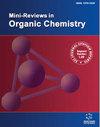Synthesis, Reactions and Biological Activity of Pyrimido [5, 4-c] Quinolines based on (Thio)Barbituric Acid and their Analogous (Part IV)
IF 1.9
4区 化学
Q2 CHEMISTRY, ORGANIC
引用次数: 0
Abstract
: Pyrimido [5, 4-c] quinolone derivatives are significant synthetic targets that show numerous interesting biological activities. The pyrimido [4, 5-b] quinoline is the most famous source of these derivatives, which has been used in medicine to antitumor and target different diseases. Since the segregation of quinoline derivatives, many synthetic methodologies were advanced for their synthesis. Despite the current interesting findings on this class of pyrimidoquinoline, the chemical literature deficits a comprehensive summary of the synthetic methodologies and biological activities of pyrimido [5, 4-c] quinoline derivatives. This review focuses on recent advances in pyrimido [5, 4-c] quinolines chemistry via debating diverse synthetic ways developed for the preparation of pyrimido [5, 4-c] quinolines and other unique derivatives that exhibited promising biological activities. Also, it sheds light on the most widespread reactions of pyrimidoquinolines and the employment of these derivatives as the essential building blocks for different biologically active compounds:. Among these reactions used to prepare pyrimido [5, 4-c] quinoline derivatives are the following: Biginelli-type one or three-component reaction, Micheal addition, intermolecular cyclization, cyclo-condensation, acylation, Vielsmeir formylation, Suzuki cross-coupling reaction, transformation, oxidation-reduction, esterification, dehydration, decarboxylation, methylation, chlorination, alkylation.基于(硫代)巴比妥酸及其类似物的嘧啶并[5,4-c]喹啉的合成、反应和生物活性(第四部分)
:嘧啶并[5,4-c]喹啉酮衍生物是重要的合成靶标,具有多种有趣的生物活性。嘧啶并[4,5-b]喹啉是这些衍生物最著名的来源,已被用于抗肿瘤和治疗不同疾病。自喹啉衍生物分离以来,许多合成方法都得到了发展。尽管目前关于这类嘧啶喹啉的研究结果令人感兴趣,但化学文献中缺乏对嘧啶并[5, 4-c] 喹啉衍生物的合成方法和生物活性的全面总结。本综述通过讨论制备嘧啶并[5,4-c]喹啉及其他具有良好生物活性的独特衍生物的各种合成方法,重点介绍了嘧啶并[5,4-c]喹啉化学的最新进展。此外,它还揭示了嘧啶类喹啉最常见的反应,以及将这些衍生物用作不同生物活性化合物的基本构件:。用于制备嘧啶并[5,4-c]喹啉衍生物的反应有以下几种:Biginelli 型单组分或三组分反应、Micheal 加成、分子间环化、环缩合、酰化、Vielsmeir 甲酰化、Suzuki 交叉偶联反应、转化、氧化还原、酯化、脱水、脱羧、甲基化、氯化、烷基化。
本文章由计算机程序翻译,如有差异,请以英文原文为准。
求助全文
约1分钟内获得全文
求助全文
来源期刊
CiteScore
4.50
自引率
4.30%
发文量
116
审稿时长
>12 weeks
期刊介绍:
Mini-Reviews in Organic Chemistry is a peer reviewed journal which publishes original reviews on all areas of organic chemistry including organic synthesis, bioorganic and medicinal chemistry, natural product chemistry, molecular recognition, and physical organic chemistry. The emphasis will be on publishing quality papers very rapidly, without any charges.
The journal encourages submission of reviews on emerging fields of organic chemistry including:
Bioorganic Chemistry
Carbohydrate Chemistry
Chemical Biology
Chemical Process Research
Computational Organic Chemistry
Development of Synthetic Methodologies
Functional Organic Materials
Heterocyclic Chemistry
Macromolecular Chemistry
Natural Products Isolation And Synthesis
New Synthetic Methodology
Organic Reactions
Organocatalysis
Organometallic Chemistry
Theoretical Organic Chemistry
Polymer Chemistry
Stereochemistry
Structural Investigations
Supramolecular Chemistry

 求助内容:
求助内容: 应助结果提醒方式:
应助结果提醒方式:


